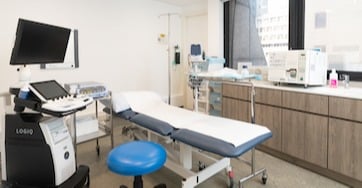A colonoscopy(大腸鏡檢查) is a common medical procedure that screens the colon for colorectal cancer[1]. As of 2018, the American Cancer Society lowered the starting age of colorectal cancer screening in asymptomatic individuals from 50 years old to 45 years old [13]. However they recommend it from an earlier age for those at a higher risk of developing colorectal cancer; for example, those with a family history of this type of cancer or those with inflammatory bowel disease (IBD)[2].
What is a colonoscopy?
Colonoscopy screening is a safe and effective procedure that prevents the development of colorectal cancer, especially in its early stages. During a colonoscopy, a specialist doctor such as a Gastroenterologist or General Surgeon evaluates the insides of the colon with a colonoscope.
A colonoscope[3], which is a long, thin, flexible tube that has a small camera inside it, is passed into your rectum. The camera then transmits an image of the colon's lining so the doctor can examine it for any abnormalities. Although this may sound uncomfortable, you will be given a sedative injection to reduce the pain or discomfort you may otherwise experience during the process. Colonoscopy is a mostly painless procedure.
After the procedure, you will begin to recover from the sedative. You may develop some gas or bloating after, but it should wear off over the next few hours. If bloating persists for over a few days, you should follow up with your doctor[4].
Who needs a colonoscopy?
You should plan to get your first colonoscopy when you reach the age of 45.[13] Individuals with a family history of colon cancer or who suffer from medical conditions which increase risk of colon cancer should discuss the optimal timing of first colonoscopy with your GP, Gastroenterologist or General Surgeon. Some organisations now advise screening from the age of 45[5]. If you are between 45 and 75 years of age or are at average risk of developing colorectal cancer, a colonoscopy is recommended once every 5 to 10 years[6]. This may vary depending on the patient. The first colonoscopy not only screens for current issues but helps to stratify risk based upon either a normal colonoscopy or the presence and type of polyps found. Once you complete your first colonoscopy the specialist will advise on the frequency of recommended follow up.
Adults who are at a higher risk of developing colorectal cancer are advised to have more frequent colorectal cancer screening until the age of 75. Any further colonoscopy after 75 is based upon medical recommendation.
A study in 2003 found that 1 out of 8 asymptomatic adults over 45 already had an adenomatous polyp in their colons. If not removed, there's a chance for adenomatous polyps to become cancerous in the future[9].
What can a colonoscopy detect?
There is more than one reason why a person may need a colonoscopy, but checking for colon cancer is perhaps the most common reason. During a colonoscopy, if polyps or growths are detected, they are removed and sent for analysis to determine if the polyp is cancerous.
Colonoscopy can also screen the intestines for the cause of other issues such as[10]:
-
Abdominal pain
-
Chronic constipation
-
Rectal bleeding
-
Mucus in stool
-
Other changes in bowel habits
How to prepare for a colonoscopy?
Your doctor will advise you on the exact colonoscopy preparation steps they would like you to take before your procedure. As a general rule, it is good to adjust your diet a few days before, and make sure you complete your bowel prep entirely.
The week before colonoscopy
It is recommended that you pay more attention to your diet a few days before your bowel prep as it will make the experience easier on the day. It may be useful to decrease your meal size and stick to soups, smoothies, and steamed vegetables. To reduce the feeling of hunger, feel free to complement your diet with small portions of rice, eggs, salmon, and chicken. You should drink plenty of water, and you can also add some digestive teas to your diet[11].
It is best to avoid foods that are heavy and harder to digest, such as red meat, nuts, and fibre-filled fruits and vegetables.
The day before colonoscopy
The day before, you will need to maintain a strictly liquid diet. Some of the drinks recommended to curb the appetite during that day are organic low-sodium broth, fruit juices, and flavoured sparkling water. You can also drink black coffee, but do not to add any creamer. You can also have an electrolyte drink to ensure maximum hydration, which will be important for the bowel prep[12].
Make sure you know exactly what time to start your bowel prep. You will be prescribed a laxative pill or a drink, and you may need to take the medicine all at once or split it over time according to your doctors instructions. It is best to take your laxative a couple hours earlier, as each body is different and it may take time for it to react to the medicine[12]. If you are prescribed a couple of dosages of laxative to be taken at different times, make sure to finish all of it, even if you feel "empty" already.
After colonoscopy
Ease into the solid foods after the procedure, and stick to the same diet you've had the week before your colonoscopy. While it is tempting to dig into a greasy meal after a week of strict diet, your bowel will thank you if you can stick to meals that are easy to digest for a couple of days.
Colonoscopy vs colectomy
Many people associate colonoscopy screening with a major intervention in their bodies. This is usually not the case, as a colonoscopy is a diagnostic method – and it may lead to a surgical procedure only if any concerning changes are detected. If a doctor discovers polyps, growth, or a tumor in your colon, or you experience symptoms such as continuous bleeding, you may be recommended for a colectomy. While colonoscopy is a necessary screening method, colectomy is a separate procedure you may be referred by a doctor depending on the issue you are experiencing.
Regarding duration and recovery time, colonoscopy takes only about 20-40 minutes and you will be good to go after the sedative medicine wears off. This usually happens within 1-2 hours from the end of the procedure. Colectomy, on the other hand, may take up to 4 hours and you may have to stay at the hospital for up to 1 week.
Help at OT&P
If you need more advice on colonoscopy preparation or the procedure itself, please do not hesitate to contact us. Our team of experienced gastroenterologists are available to answer any questions about the procedure.
References
-
nhs.uk. 2019. Colonoscopy. [online] Available at: <https://www.nhs.uk/conditions/colonoscopy/why-its-done/> [Accessed 30 October 2020].
-
Colorectal Cancer Guideline: How Often to Have Screening Tests. (n.d.). [online] Available at: <https://www.cancer.org/cancer/colon-rectal-cancer/detection-diagnosis-staging/acs-recommendations.html> [Accessed 04 November 2020].
-
WHO. (2011). Colonoscope. [online] Available at: <https://www.who.int/medical_devices/innovation/colonoscope.pdf> [Accessed 04 November 2020]
-
Mayoclinic.org. 2020. Colonoscopy. [online] Available at: <https://www.mayoclinic.org/tests-procedures/colonoscopy/about/pac-20393569> [Accessed 30 October 2020].
-
Harvard Publishing. By the way, doctor: How often should I have a colonoscopy? [online] Available at:<https://www.health.harvard.edu/staying-healthy/by_the_way_doctor_how_often_should_i_have_a_colonoscopy> [Accessed 04 November 2020].
-
Lam, T., MD. (2018). Recommendations on prevention and screening for colorectal cancer in Hong Kong. [online] Available at: <https://www.hkmj.org/abstracts/v24n5/521.htm> [Accessed 04 November 2020].
-
NHS. (2020). Bowel Polyps. [online] Available at: <https://www.nhs.uk/conditions/bowel-polyps/> [Accessed 04 November 2020].
-
Colonoscopy. (2020, April 18). [online] Available at: <https://www.mayoclinic.org/tests-procedures/colonoscopy/about/pac-20393569> [Accessed November 04 2020]
-
NHS. (2019). Colonoscopy. Getting ready. [online] Available at: <https://www.nhs.uk/conditions/colonoscopy/getting-ready/> [Accessed December 02 2020]
-
Worrall, S. (2019, September 21). Colonoscopy Prep: 8 Expert Tips for the Night Before. [online] Available at: <https://fightcolorectalcancer.org/blog/colonoscopy-prep-tips/> [Accessed December 02 2020]
-
Colorectal cancer guideline: How often to have screening tests. Colorectal Cancer Guideline | How Often to Have Screening Tests | American Cancer Society. (n.d.). https://www.cancer.org/cancer/types/colon-rectal-cancer/detection-diagnosis-staging/acs-recommendations.html

 Central General Practice
Central General Practice
 Repulse Bay
Repulse Bay
 Clearwater Bay
Clearwater Bay
 BodyWorX Clinic
BodyWorX Clinic
 Central Specialist Clinic
Central Specialist Clinic
 MindWorX Clinic
MindWorX Clinic
 Partner Clinics
Partner Clinics
 Family Clinic
Family Clinic
 OT&P Annerley Midwives Clinic
OT&P Annerley Midwives Clinic


